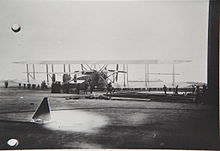AEG R.I
| R.I | |
|---|---|
 | |
| General information | |
| Type | Bomber |
| National origin | Germany |
| Manufacturer | AEG |
| Primary user | Luftstreitkräfte |
| Number built | 1 completed and seven more partially built.[1] |
| History | |
| First flight | 1916[1] |
The AEG R.I or Riesenflugzeug 1 (meaning "giant aircraft") was a four-engined biplane bomber aircraft of World War I manufactured by AEG.[1]
Design and development
The R.I was unusual for a multi-engined aircraft in that rather than connecting propellers directly to the engines and mounting the engines in nacelles, the R.I carried all its engines within the fuselage and turned its propellers via a system of drive shafts. A single prototype was completed and flew in 1916. Initial flights were quite successful, the aircraft being considered very manoeuvrable, but on 3 September 1918, a newly assembled propeller, which had not been given sufficient time for glue to cure, disintegrated. The vibrations resulting from that failure caused the complex transmissions and shafting connecting all four engines to both propellers to tear loose, which then cut a center section strut, resulting in the breakup of the aircraft, killing all seven crew on board. Of the seven further AEG R.1 aircraft planned or under production when the war ended, (R.21, R.22, R.59, R.60, R.61, R.62, R.63 and R.64), only R.21 was finished and R.22 partially complete.[1]
Specifications

Data from The German Giants.[1]
General characteristics
- Length: 19.5 m (64 ft 0 in)
- Wingspan: 36 m (118 ft 1 in)
- Height: 6.35 m (20 ft 10 in)
- Wing area: 260 m2 (2,800 sq ft)
- Empty weight: 9,000 kg (19,842 lb)
- Gross weight: 12,700 kg (28,000 lb)
- Fuel capacity: 2,750 litres (605 Imp.Gall.)
- Powerplant: 4 × Mercedes D.IVa 6 cyl. water-cooled in-line piston engines, 194 kW (260 hp) each
- Propellers: 2 x 2-bladed, 5.2 m (17 ft 1 in) diameter
Armament
- Guns: 5 × 7.92 mm (.312 in) machine guns
- Bombs: up to 3,800kg (8,377lb)
See also
Related lists
